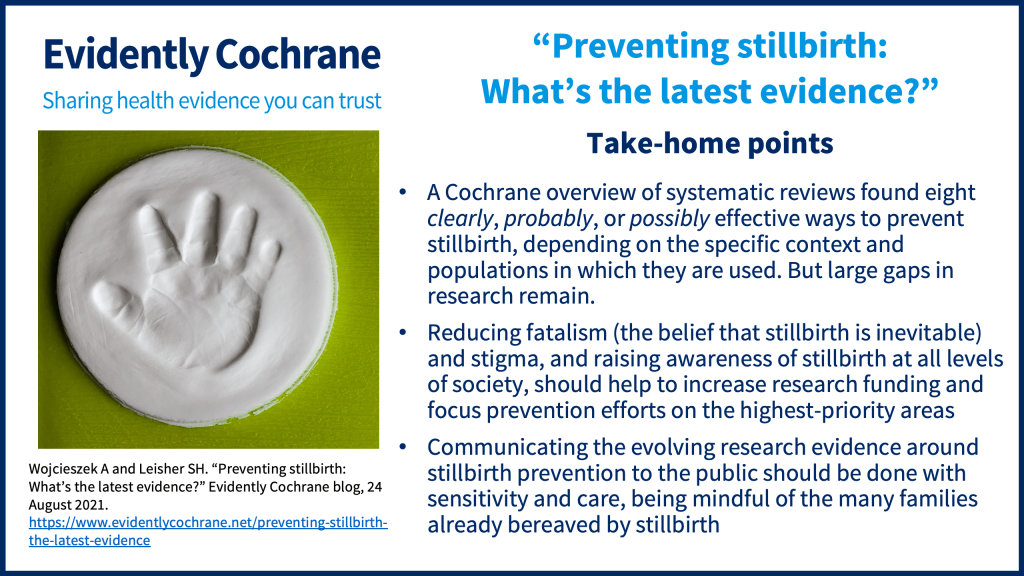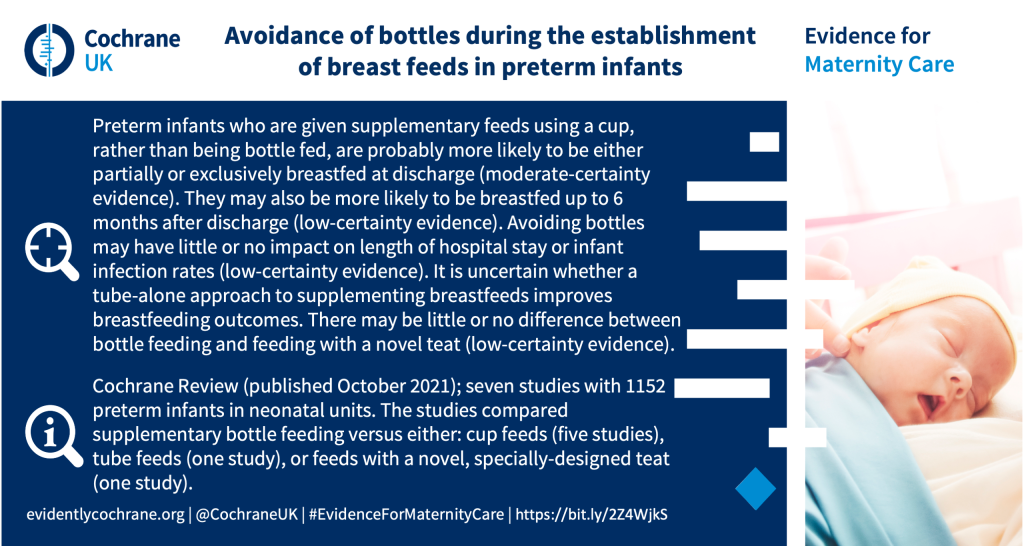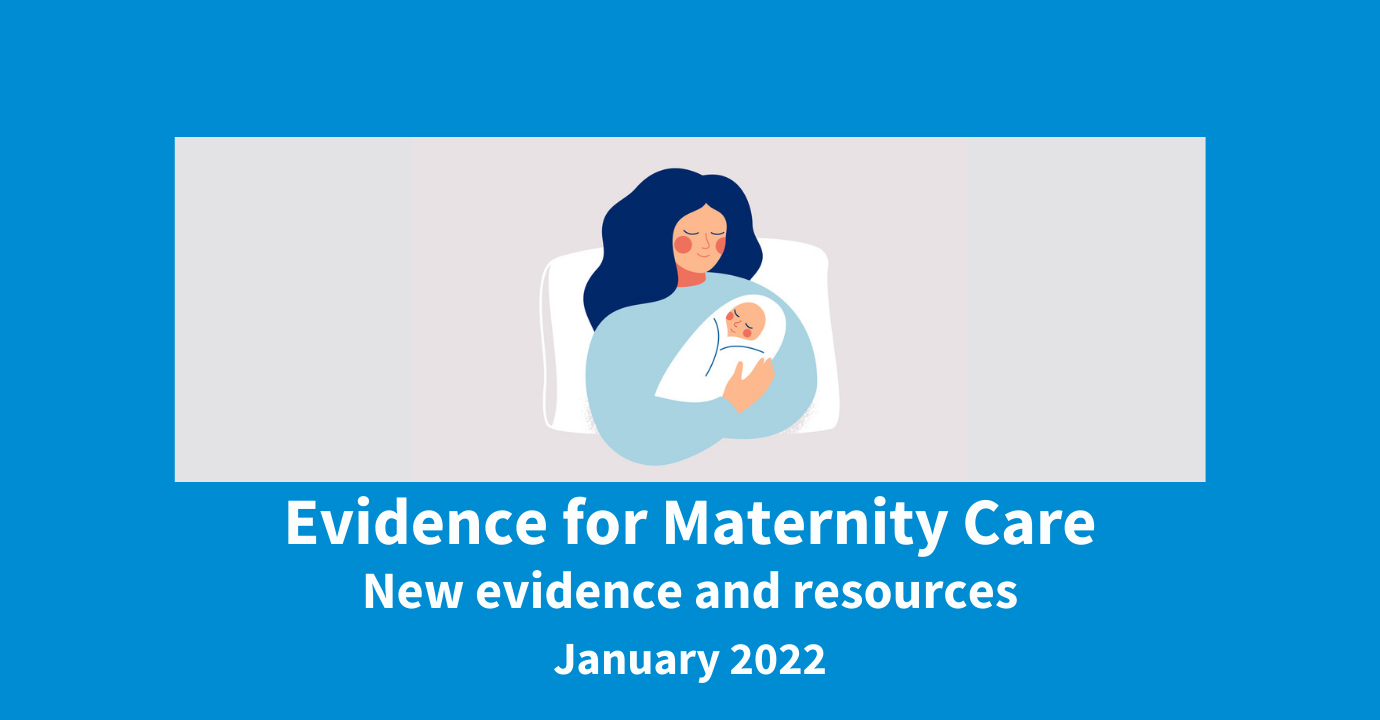The latest evidence and resources for midwives and clinical support staff. You can either scroll through this page or click on any of the links below to jump to the relevant section.
Please note, unlike the rest of our blogs, our ‘Evidence for Maternity Care: new evidence and resources’ blogs will not be updated.
- COVID-19
- Antenatal care
- Labour and birth
- Postnatal care and care of the newborn, including preterm infants
- Patient questionnaires
- Opportunities and events
.
.
COVID-19
This year, Cochrane is continuing to produce new and updated reviews in response to the pandemic. We have blogged about many of them and this blog COVID-19 evidence: a Cochrane round-up brings together a large collection of evidence and resources, starting from when this evidence was first being produced in spring 2020. Like the reviews themselves, all our blogs are updated to reflect new evidence.
Cochrane Special Collections
Cochrane Special Collections assemble Cochrane Reviews on important topics for the prevention and treatment of COVID-19. They are developed with experts from our global Cochrane network. They are based on World Health Organization interim guidance, and continuously updated. You can find Coronavirus (COVID-19) Special Collections here.
Cochrane Podcasts
Cochrane COVID-19 Podcasts offer short summaries of Cochrane COVID-19 reviews from the authors themselves. A good way to hear the latest Cochrane evidence in under 5 minutes each.
Cochrane Clinical Answers
Cochrane Clinical Answers (CCAs) provide a readable, digestible, clinically-focused entry point to rigorous research from Cochrane ReviewsCochrane Reviews are systematic reviews. In systematic reviews we search for and summarize studies that answer a specific research question (e.g. is paracetamol effective and safe for treating back pain?). The studies are identified, assessed, and summarized by using a systematic and predefined approach. They inform recommendations for healthcare and research.. They are designed to be actionable and to inform point-of-care decision-making. Each CCA contains a clinical question, a short answer, and data for the outcomes from the Cochrane Review deemed most relevant to practising healthcare professionals.
You can find Cochrane Clinical Answers related to COVID-19 here.
Antenatal care
Fear of pregnancy and childbirth
A Cochrane Review on Interventions for fear of childbirth including tocophobia looked at the evidence for non-pharmacological interventions, such as CBT, and found that the effects on fear are uncertain but that they probably reduce the number of women having a caesarean section.
Cochrane Clinical Answer: What are the effects of non‐pharmacological interventions for women with fear of pregnancy and childbirth?
Stillbirth prevention and respectful bereavement care
A Cochrane Special Collection Stillbirth prevention and respectful bereavement care highlights evidence-based interventions to reduce stillbirth and improve care for families after stillbirth and in a subsequent pregnancy, identify women at increased riskA way of expressing the chance of an event taking place, expressed as the number of events divided by the total number of observations or people. It can be stated as ‘the chance of falling were one in four’ (1/4 = 25%). This measure is good no matter the incidence of events i.e. common or infrequent. of stillbirth, and improve knowledge of causes of and contributors to stillbirth.
There is an accompanying Evidently Cochrane blog: Preventing stillbirth: what’s the latest evidence?.

The authors of this blog also wrote another – Pregnancy after stillbirth: experience and evidence gaps, in which they discuss the research gap and Susannah shares her personal experience of stillbirth, followed by many women sharing their own stories in the comments.
Ultrasound-estimated fetal weight for identifying placental dysfunction
Cochrane Clinical Answer: Can ultrasound‐estimated fetal weight (EFW) after 24 weeks of pregnancy identify placental dysfunction that could result in a small‐for‐gestational‐age (SGA) infant?
Labour and birth
Induction of labour versus expectant management
Cochrane Clinical Answer: For women at or beyond term, how does induction of labor compare with expectant management for maternal outcomes?
Instruments for assisted vaginal birth
The updated Cochrane Review Instruments for assisted vaginal birth (September 2021) finds that:
- forceps may be more likely to achieve vaginal birth and have lower rates of fetal trauma, but at a greater risk of perineal trauma and higher pain relief requirements compared with vacuum cups
- rigid vacuum cups may be more likely to achieve a vaginal birth than soft cups but with more fetal trauma, whilst handheld vacuum cups had similar success rates compared to other cups
- There was no evidence of a difference in the rates of third‐ or fourth‐degree tears or postpartum haemorrhages between types of cups, but wide confidence intervals around the estimates indicate further research is needed in this area.
Postnatal care and care of the newborn, including preterm infants
Avoidance of bottles in establishing breastfeeds in preterm infants
The authors of the Cochrane Review Avoidance of bottles during the establishment of breastfeeds in preterm infants (October 2021) have concluded:
“Avoiding the use of bottles when preterm infants need supplementary feeds probably increases the extent of any breastfeeding at discharge, and may improve any and full breastfeeding (exclusive) up to six months postdischarge. Most of the evidence demonstrating benefit was for cup feeding. Only one studyAn investigation of a healthcare problem. There are different types of studies used to answer research questions, for example randomised controlled trials or observational studies. used a tube feeding strategy. We are uncertain whether a tube alone approach to supplementing breastfeeds improves breastfeeding outcomesOutcomes are measures of health (for example quality of life, pain, blood sugar levels) that can be used to assess the effectiveness and safety of a treatment or other intervention (for example a drug, surgery, or exercise). In research, the outcomes considered most important are ‘primary outcomes’ and those considered less important are ‘secondary outcomes’..”

This review has been added to two existing Evidently Cochrane blogs:
- “Yummy, yummy in my tummy, getting big with milk from mummy. Getting preterm babies feeding orally – a roundup of current evidence”
- “Breastfeeding: a round-up of Cochrane evidence”
Cochrane Clinical Answer: For preterm infants, does avoidance of bottles during establishment of breast‐feeding help to increase the extent and duration of breast‐feeding?
Corticosteroids for prevention of bronchopulmonary dysplasia
A Cochrane Review Early (< 7 days) systemic postnatal corticosteroids for prevention of bronchopulmonary dysplasia in preterm infants (October 2021) has been updated. From high-certaintyThe certainty (or quality) of evidence is the extent to which we can be confident that what the research tells us about a particular treatment effect is likely to be accurate. Concerns about factors such as bias can reduce the certainty of the evidence. Evidence may be of high certainty; moderate certainty; low certainty or very-low certainty. Cochrane has adopted the GRADE approach (Grading of Recommendations Assessment, Development and Evaluation) for assessing certainty (or quality) of evidence. Find out more here: https://training.cochrane.org/grade-approach evidence, the review authors have found that systemic postnatal corticosteroids, in the regimens used, have had “significant short‐term and long‐term effects ‐ both beneficial and harmful”. They conclude that “Early systemic postnatal corticosteroid treatmentSomething done with the aim of improving health or relieving suffering. For example, medicines, surgery, psychological and physical therapies, diet and exercise changes. (started during the first six days after birth) prevents BPD [bronchopulmonary dysplasia] and the combined outcome of mortalitydeath or BPD. However, it increases risks of gastrointestinal perforation, cerebral palsy, and the combined outcome of mortality or cerebral palsy. Most beneficial and harmful effects are related to early treatment with dexamethasone, rather than to early treatment with hydrocortisone, but early hydrocortisone may prevent mortality, whereas early dexamethasone does not.”
Cochrane Clinical Answer: For preterm infants with evolving or established bronchopulmonary dysplasia, what are the effects of systemic corticosteroids administered within eight days after birth?
The Cochrane Review Late (≥ 7 days) systemic postnatal corticosteroids for prevention of bronchopulmonary dysplasia in preterm infants (November 2021) has also been updated. There is high-certainty evidence that “late systemic postnatal corticosteroid treatment (started at seven days or more after birth) reduces the risks of mortality and BPD, and the combined outcome of mortality or BPD, without evidence of increased cerebral palsy. ” But the authors note that there is limited evidence on long-term outcomes, including possible neurodevelopment harms.
Cochrane Clinical Answer: For preterm infants with evolving or established bronchopulmonary dysplasia (BPD), what are the effects of late (≥ 7 days) systemic corticosteroids (CSs)?
CPAP for preterm infants
The authors of a Cochrane Review Nasal continuous positive airway pressure levels for the prevention of morbidity and mortality in preterm infants (November 2021) conclude: “There are insufficient dataData is the information collected through research. from randomizedRandomization is the process of randomly dividing into groups the people taking part in a trial. One group (the intervention group) will be given the intervention being tested (for example a drug, surgery, or exercise) and compared with a group which does not receive the intervention (the control group). trialsClinical trials are research studies involving people who use healthcare services. They often compare a new or different treatment with the best treatment currently available. This is to test whether the new or different treatment is safe, effective and any better than what is currently used. No matter how promising a new treatment may appear during tests in a laboratory, it must go through clinical trials before its benefits and risks can really be known. to guide nasal CPAP level selection in preterm infants, whether provided as initial respiratory support or following extubation from invasive mechanical ventilation. We are uncertain as to whether low or moderate‐high nasal CPAP levels improve morbidityillness or harm and mortality in preterm infants.”
There is also a Cochrane Clinical Answer Can prophylactic nasal continuous positive airway pressure help to prevent morbidity and mortality in very preterm infants? for the review Prophylactic or very early initiation of continuous positive airway pressure (CPAP) for preterm infants (October 2021).
Enteral zinc supplementation
The Cochrane Review Enteral zinc supplementation for prevention of morbidity and mortality in preterm neonates (February 2021) found that “Enteral supplementation of zinc in preterm infants compared to no supplementation or placeboAn intervention that appears to be the same as that which is being assessed but does not have the active component. For example, a placebo could be a tablet made of sugar, compared with a tablet containing a medicine. may moderately decrease mortality and probably improve short‐term weight gain and linear growth, but may have little or no effect on common morbidities of prematurity. There are no data to assess the effect of zinc supplementation on long‐term neurodevelopment.”
Cochrane Clinical Answer: What are the benefits and harms of enteral zinc supplementation for preterm neonates?
Home visits in the early postpartum period
A Cochrane Review on Schedules for home visits in the early postpartum period was updated in July 2021. The review authors found that:
- The evidence is very uncertain about the effect of home visits on maternal and neonatal mortality.
- Individualised care as part of a package of home visits probably improves depression scores at four months.
- Increasing the frequency of home visits may improve exclusive breastfeeding rates and infant healthcare utilisation.
- Maternal satisfaction may also be better with home visits compared to hospital check‐ups.
Cochrane Clinical Answers:
- How do different frequencies of home visits in the early postpartum period compare?
- How do different methods of providing postnatal care at home in the early postpartum period compare?
- How do home visits compare with hospital clinic visits in the early postpartum period?
Opioid withdrawal in newborn infants
The Cochrane Review Opioid treatment for opioid withdrawal in newborn infants was updated in July 2021 with new trials added and conclusions changed.
Cochrane Clinical Answer: For newborn infants with opioid withdrawal, how does morphine compare with methadone, buprenorphine, phenobarbital, and chlorpromazine?
Postnatal depression
The Cochrane Review Antidepressant treatment for postnatal depression (February 2021) found that “there remains limited evidence regarding the effectivenessThe ability of an intervention (for example a drug, surgery, or exercise) to produce a desired effect, such as reduce symptoms. and safetyRefers to serious adverse effects, such as those that threaten life, require or prolong hospitalization, result in permanent disability, or cause birth defects. of antidepressants in the management of postnatal depression, particularly for those with more severe depression.”
Cochrane Clinical Answer: How do selective serotonin reuptake inhibitors (SSRIs) compare with placebo for women with postnatal depression?
Tube feeding preterm and low birth weight infants
The Cochrane Review Monitoring of gastric residual volume during enteral nutrition (September 2021) concludes that “The evidence is very uncertain about the effect of GRV [gastric residual volume] on clinical outcomes including mortality, pneumonia, vomiting, and length of hospital stay.”
Cochrane Clinical Answers:
- For preterm or very low birth weight infants, how does slow advancement compare with fast advancement of enteral feed volumes?
- How do high‐ and standard‐volume fortified enteral feeds compare for improving outcomes in preterm or low birthweight infants?
- How does continuous nasogastric milk feeding compare with intermittent bolus milk feeding for preterm infants?
- What are the effects of push versus gravity for intermittent bolus gavage tube feeding of premature and low birth weight infants?
Reducing perinatal and maternal deaths
Cochrane Clinical Answer: Do perinatal and maternal death reviews and audits reduce perinatal and maternal mortality?
Patient questionnaires
Using patient questionnaires for improving clinical management and outcomes – an interview with Cochrane review author Christopher Gibbons about their recent Cochrane Review to find out whether healthcare workers who receive information from questionnaires completed by their patients give better health care and whether their patients have better health.
Opportunities and events
On this page, Important Cochrane Links, you can find opportunities to get involved, including how to join Cochrane, find volunteer tasks, or jump into the Cochrane Library.
Hundreds of health leaders and experts met on October 14 to recommend the international community urgently mount stronger evidence-based responses to global health emergencies. Recordings from this event are now available on this page: Cochrane Convenes recordings available: the world must learn from pandemic lessons to avoid future catastrophes.
Please note that this page includes a round-up of material published between September 2021 until the end of December 2021, and it will not be updated after it’s posted.
Join in the conversation on Twitter with @SarahChapman30 and @CochraneUK or leave a comment on the blog.
Please note, we cannot give medical advice and do not publish comments that link to individual pages requesting donations or to commercial sites, or appear to endorse commercial products. We welcome diverse views and encourage discussion but we ask that comments are respectful and reserve the right to not publish any we consider offensive. Cochrane UK does not fact check – or endorse – readers’ comments, including any treatments mentioned.
Sarah and Selena have nothing to disclose.


